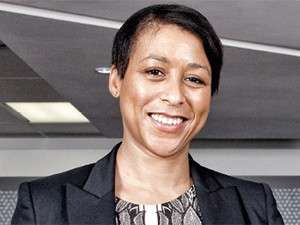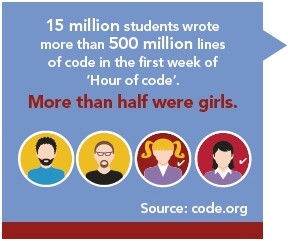
As president for Avanade, Europe, Africa and Latin America (EALA), Pamela Maynard is responsible for directing strategy and operations across 14 geographies. She sees not only the struggles but also the triumphs of women in this business. Maynard had set her sights on a career in law, but she changed her mind and chose to do management science instead. "I wanted to study something that was going to give me variety. This degree gave me exposure to IT, economics, business strategy and marketing. After graduating, I decided to consult because in consulting, there is a lot of variety."
It was only once Maynard started working at Oracle that she was truly exposed to technology. "To be honest," she says, "I knew nothing about Oracle, but I loved the feel of the organisation, so I decided to join. I started as a programmer, went on to design, analysis, project management and basically moved up through the different levels." Oracle was shaping its business consulting team, which is where Maynard asked to be placed. "This is when I started to develop a real hunger for technology enabled business transformation."
In the years that followed, Maynard honed her skills at prestigious companies such as Ernst & Young and Capgemini Legacy. "I was given plenty of different opportunities, like setting up new teams, taking new propositions to market, and troubleshooting areas of the business that weren't performing well."
When it comes to IT, the UK market is no different to the local market. Women are still hugely underrepresented. Not enough girls are coming out of school and choosing to study engineering, maths or science. "But that's okay," says Maynard. "I didn't study any of those, but still found myself in the field of technology. Yes, they're important disciplines, but you can learn about technology.
We can bring in talented women in terms of their strengths, which are around engaging teams, collaborating, being empathetic and being able to influence business decisions. Why can't we play to women's strengths as well as train them in technology disciplines, like I was?" she asks.
"Lots of European countries are still not seeing enough women come through the technology and maths ranks. Even as far as Australia, there's a lack of female scientists.
"But let's look at the bigger picture. There are solutions to this problem. "One of the things women like me should be doing is going into schools and universities to talk about what a career in technology is really about. Yes, you can develop applications as I did, but thinking back to my first choice around law, the options could be data law, contract law, there's always an angle from a legal perspective.
Possibilities
"The whole marketing space has transformed now around technology and technology service - that is a big growth area," she emphasises. "There are different functions that are contributing to growing the technology world, and we need to educate more women and girls about these functions and help them understand the value they could get from a career in technology." Maynard believes the problem has its roots in the fact that most people associate IT with hardcore programming. By the end of 2013, 'hour of code' was launched by Code.org. It was meant to encourage more interest in hard-core computer programming. Fifteen million students had written more than 500 million lines of code in the first week. Of those 15 million students, more than half were girls.
Lack of understanding
But there are so many other aspects to IT, says Maynard. "When my goddaughter was 17, she was selected to take part in a youth enterprise programme. This guy came in to talk about the business he had started, which was all around data warehousing and analytics. She said it was absolutely fascinating. It wasn't the data mining and the analytics that interested her so much. She found the outcomes interesting and what he was able to use that data for. At the heart of it all, though, was a piece of data-based technology. "So it's basically a lack of understanding the possibilities at your fingertips if you're in the IT industry."
We're allowing ourselves to be treated differently because we're not bold enough or confident enough to ask for what we want and need.
Businesses are becoming technology businesses themselves, says Maynard, and that transformation gives her hope in terms of encouraging more women into IT.
"To succeed in business, you have to have an understanding of technology. So I'm really hopeful that as more and more women join the business world, they'll join the industry." Statistics prove that Maynard's hopes could be met. According to 2012 research by Intel's Genevieve Bell, women in Western countries use the internet 17 percent more than men.

Women also use their cellphones and Skype more, use location-based services more, and use social media more often. The study also showed that the majority of owners of technology devices are women. But there are clear differences in the way men and women behave in the business world. A study by the University of Texas showed that women asked for nearly $7 000 less than men at the same job interview.
"I mentor both men and women and I see the differences in the way women are treated because of the way they behave. "When I came into my EALA role, I met with staff members reporting directly to me. The men were much more forthcoming about what they expected from me and about what they wanted.
"Not a single one of my female direct reports did the same thing. It was fascinating. That has brought me to the conclusion that women don't ask for what they want. We're allowing ourselves to be treated differently because we're not bold enough or confident enough to ask for what we want and need." That has to change.
"Think about the opportunity lost," says Maynard. "Think about the things you won't achieve because you don't put yourself out there."
This article was first published in Brainstorm magazine. Click here to read the complete article at the Brainstorm website.
Share